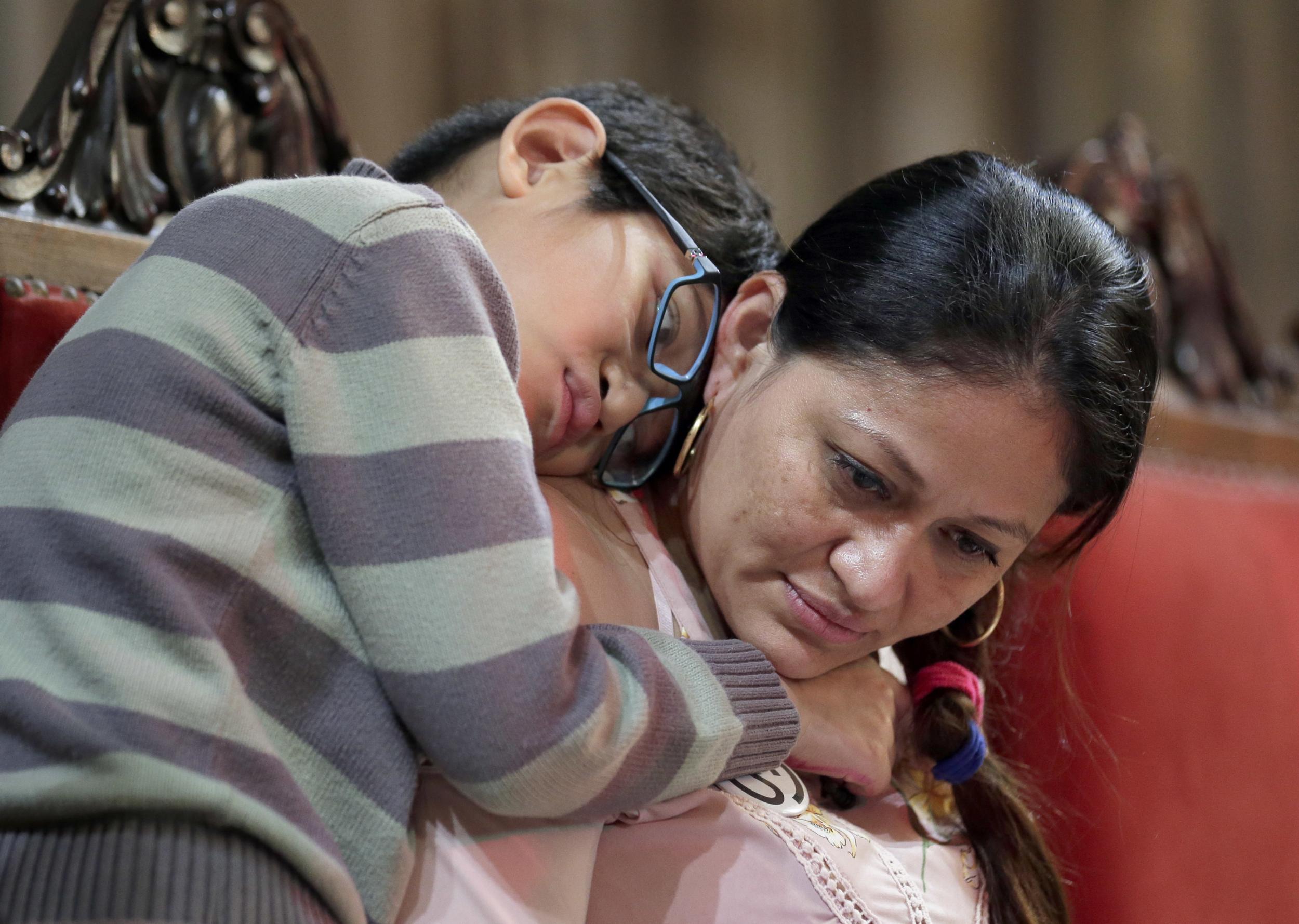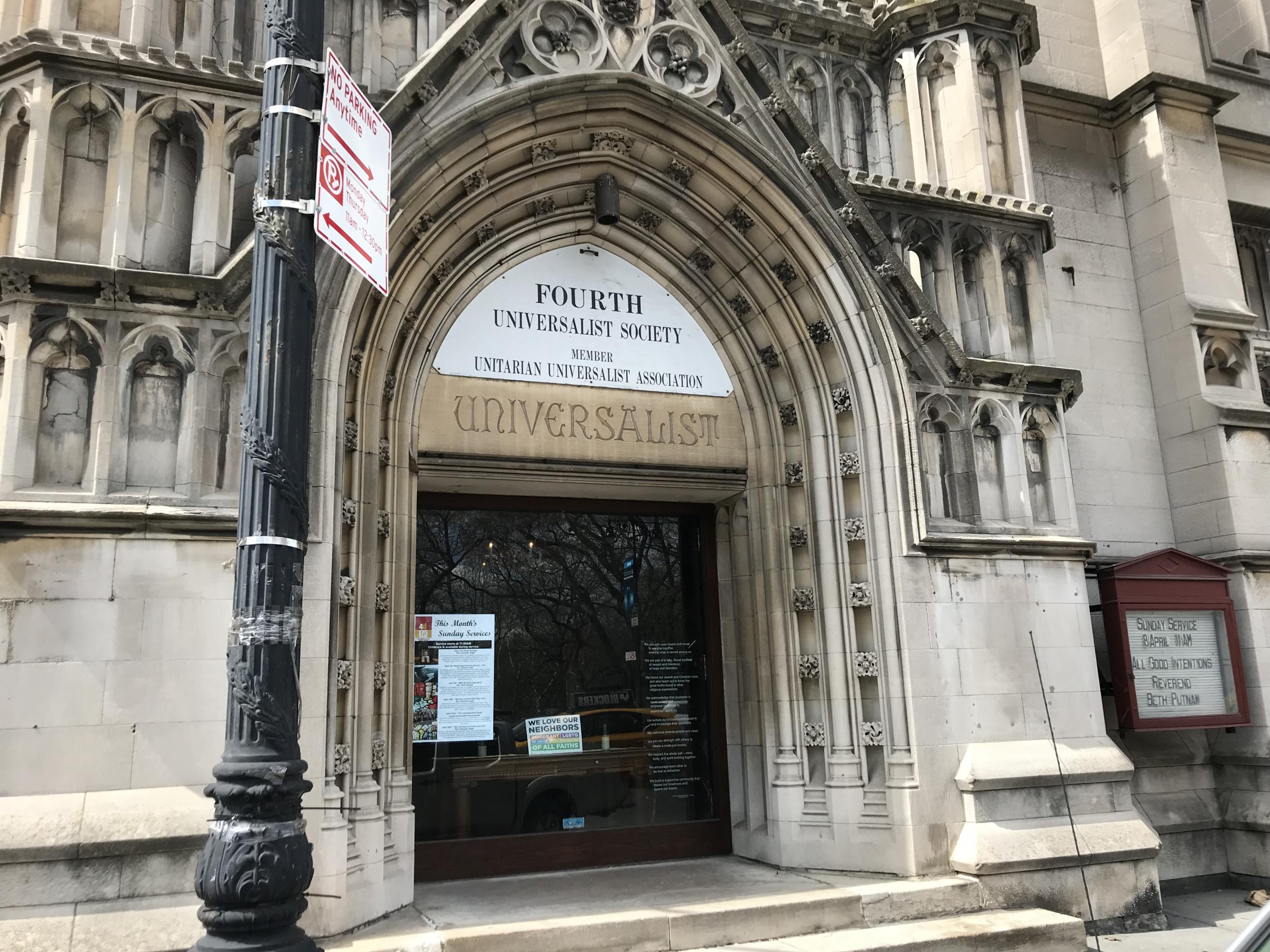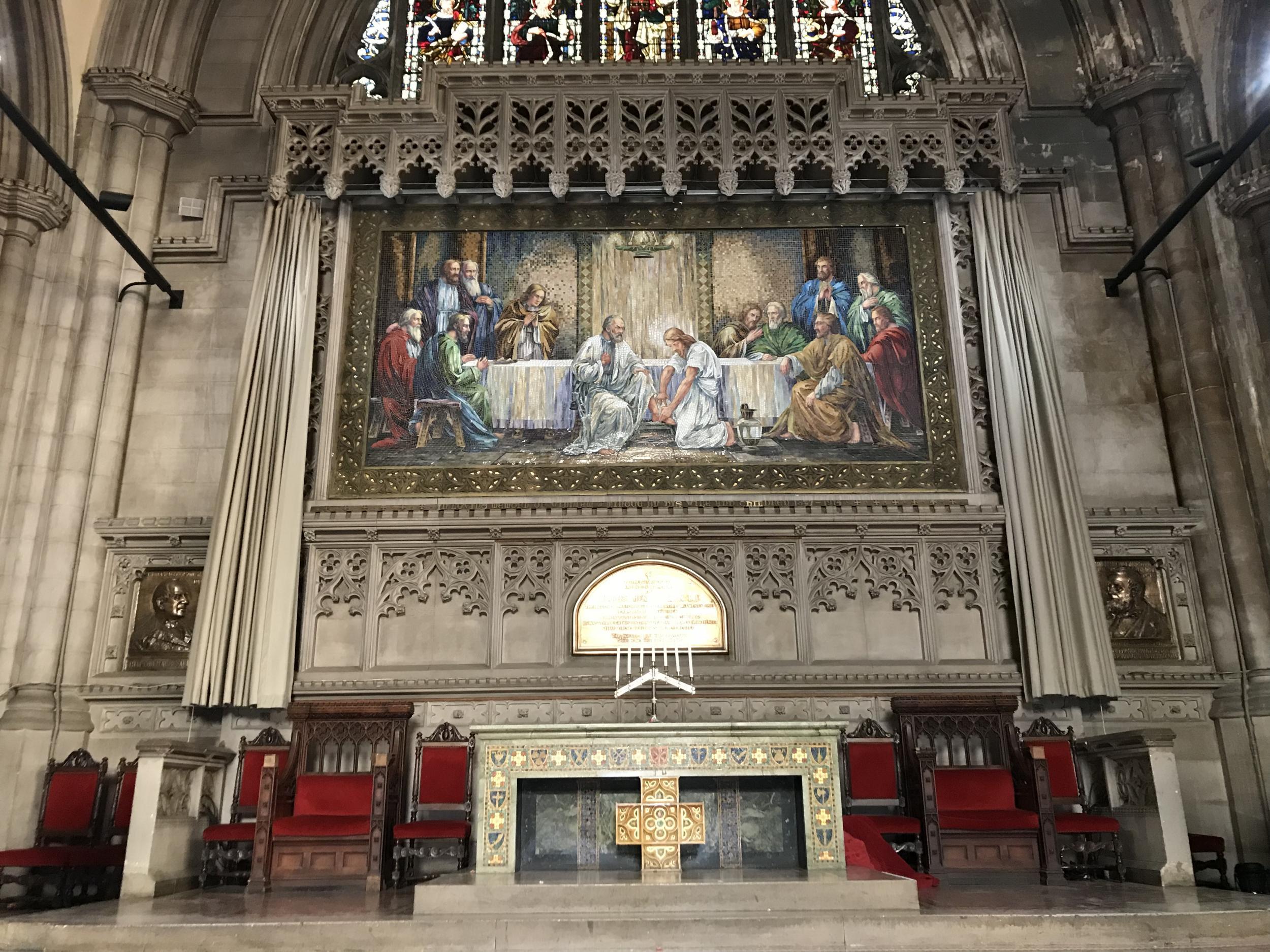‘It’s like a prison’: Immigrant mother describes weeks-long hideout inside New York church to avoid deportation
The Independent talks to Aura Hernandez, a 37-year-old from Guatemala who has taken refuge from the Trump administration’s crackdown on immigrants
As the Trump administration ramps up its war on illegal immigration, an undocumented mother from Guatemala has locked herself inside a Manhattan church in a desperate attempt to stay with her family.
Three weeks ago, Aura Hernandez fled under cover of night to The Fourth Universalist Society – a Unitarian church that serves as a sanctuary for those facing deportation. Ms Hernandez, whose two children were both born in the US, plans to stay inside the sanctuary’s stone walls until she is granted permission to remain in the country – or until she is forced out. No one knows how long that will be.
In her room on the top floor of the church, which she shares with her 15-month-old daughter, Camila, her personal belongings are stacked in bins, like a college dorm room. She has a sofa bed and a small living room where she plays with her 10-year-old son, Danny, on the weekends – the only time she gets to see him.
She has a small table where she likes to dine with friends – most of whom are congregation members, because none of her friends from before she moved can visit her now. Sometimes these new friends bring over groceries, and they all cook together. She likes that many of her new friends are from different countries, and teach her their new, exciting cuisines.
A lot of Ms Hernandez’s life is new now: a new home, new friends, a new religion to learn about on Sundays. She says she likes exploring these unfamiliar lifestyles; chatting with the congregation members, meeting their families and eating their foreign food.
But she still cries when she thinks of the life she left at home.

Ms Hernandez came to the US in 2005, at the age of 24, fleeing violence and domestic abuse in her native Guatemala. She was detained by Customs and Border Patrol for three days, but was ultimately released into the US with orders to appear in a Texas courtroom.
Ms Hernandez never showed up. The orders, she said, were written in English. According to an account published in The Nation, she did not even know she was under a deportation order until 2012, when she was pulled over for driving the wrong way down a one way street. By then she had moved to Westchester, a county north of New York City, and was making a living as a housekeeper. She met her husband – a fellow undocumented immigrant – and gave birth to Danny.
After learning of the deportation order, Ms Hernandez worked with an immigration lawyer to apply for a special visa for crime victims. The visa was denied, but Immigration and Customs Enforcement (ICE) allowed her to stay in the country as long as she attended regular meetings. But last year, when President Donald Trump took office, the meetings became more frequent. At one check-in late last year, ICE agents told her she would have to leave the country altogether.
The agency confirmed in a statement that the New York field office had ordered Ms Hernandez to leave the country by 30 November 2017, then extended the deadline to 1 March 2018.
“Hernandez did not report as required and is now considered an ICE fugitive,” the agency said.
Through a translator, Ms Hernandez explained to The Independent that she could not imagine moving away from her children. But she also could not imagine taking them back with her to Guatemala. Aside from the violence she has experienced in the country, she knew there were fewer job opportunities, poorer schools and worse health care awaiting her children if they moved.
Her immigration lawyer filed petitions for asylum, but Ms Hernandez knew those would take time to process. She needed somewhere safe to live while she waged the legal battle to stay with her family. That’s when she found The Fourth Universalist Society.

The Fourth Universalist Society – a stately, 120-year-old church on Manhattan’s affluent Upper West Side – is a house of worship, a historic landmark, and a sanctuary congregation.
The term “sanctuary congregation” refers to places of worship that offer to shield undocumented immigrants from deportation. Churches, temples and mosques are generally considered safe spaces because ICE classifies them as “sensitive sites” where they avoid making arrests.
Sanctuary congregations have also become more popular under the Trump administration, which has already started to crack down on undocumented immigrants. Shortly after taking office, Mr Trump instructed ICE to focus on all 11 million undocumented immigrants in the US – not just those with criminal convictions. In 2017 he deported double the number of immigrants that his predecessor, Barack Obama, did the year before.

Reverend Schuyler Vogel, the senior minister of The Fourth Universalist Society, said he first heard about the sanctuary movement from a friend at Faith in New York, a grassroots organisation that organises congregations around social and political issues. Mr Vogel brought the idea to the church board, and then to the congregation. They voted unanimously to become a sanctuary congregation early last year.
After Mr Trump's election, Mr Vogel said, the congregants were “thinking about ways that we could be a force for good in the world, and how we could to respond to what we certainly considered a negative turn of events”.
“[We were thinking about] how to be a community that did something tangible and concrete – that didn’t just sort of talk a good game but actually did something of value and use,” he said.
Ms Hernandez was the first person to take them up on the offer. In fact, at the time Mr Vogel received her request, the congregation had only voted to take in immigrants for up to a few days. Ms Hernandez needed to stay indefintely.
The reverend couldn’t bring the issue to another full congregation vote, because of the urgency and secrecy required. Instead, he took the request to the board president and the director of administration, who surprised him by saying yes.
On the night Ms Hernandez moved in, the church did not even have a bed for her, much less a working shower. But over the intervening weeks, the congregation rallied to build her a home. Even now, volunteers bring her food, do her laundry and bring their children to play with Camila and Danny. Ms Hernandez attends services on Sundays, and her children participate in the church’s religious education classes.
“With Aura, our work in the congregation is to say we are hers, and she is ours,” Mr Vogel said. “And [to say] that we are here to hold her, and support her, and walk with her in love, and make sure that her interests are our interests.”
He added: “We care for her, and hopefully she cares for us.”

Ms Hernandez says she does care for the congregation members a great deal. She loves going to church service, and chats with congregants for hours. It is overwhelming, she says, to see how many people have come to her aid.
But that doesn’t change the fact she cannot set foot outside the church, and does not know when she ever will. She cannot see her old friends, for fear of her safety and theirs. Many of them have stopped calling and texting, she said. They are afraid they will end up like her.
Despite the support of the congregation, Ms Hernandez says her new home still feels “like a prison”.
What she misses most about her old life are the small, routine things: picking up her kids from school, doing homework with them, visiting the park every afternoon, settling in at home after a long day at work.
Her life in Westchester had taken on the familiar rhythm of middle age: She would cook dinner, her husband would do the dishes. She would wash the laundry, he would fold it. She smiled as she remembered the two of them chasing each other around the apartment, playfully swatting each other with freshly laundered clothes.
Her husband is staying strong, she said, and they are focusing on fighting this battle together. But she knows he still misses seeing his wife and daughter during the week.
Ms Hernandez, meanwhile, desperately misses Danny, who lives with her husband in Westchester. Before she moved, Ms Hernandez used to volunteer at Danny’s school: at book fairs, in the library and at his soccer games. Not yet at the age where his parents were a constant embarrassment, Danny was always excited to see his mother show up. He would hug her tightly, she says, and proclaim proudly to his friends: “That’s my mom!”
These days, Danny hugs her all the time when he comes to visit, but for a different reason: he is afraid to let her go.
“He always tells me he doesn’t want to leave on Sunday nights,” she says. “He doesn’t want to leave because he’s afraid the police will come to the church and take me away.”
Ms Hernandez is working a plan to get out of the church. A legal team has been set up to help her, looking into all angles for an asylum or visa application. For her part, she has been doing interviews and press briefings to raise awareness of the cause. She appreciates the help of everyone around her, but subscribes to a personal maxim that translates roughly to: “Help yourself so that I will also help you.”
There are days when she fears she will never be able to return to her family, but she tries to focus on an overarching goal: not only getting out of the church, but getting out with her head held high.
There is some hope this could happen. Of the 37 people who sought sanctuary in houses of worship in 2017, nine of them were granted some sort of reprieve from deportation, according to the Church World Service. Of the 12 who sought sanctuary in 2018, six have been granted reprieves.
There is also a good deal of doubt. Just think week, the White House announced it would push for new legislation to make it harder to apply for asylum in the US. The Justice Department added that it would start rating immigration judges based on the number of cases they close – an attempt to reduce the backlog of cases and speed up deportations.
For now, Ms Hernandez keeps her fears at bay by thinking positively. She says that when Danny was younger, he would often ask her why his friend’s families got to go on vacations while theirs never did. When she gets out of the church, she says, she is taking the whole family to Disneyland.
Join our commenting forum
Join thought-provoking conversations, follow other Independent readers and see their replies
Comments
Bookmark popover
Removed from bookmarks